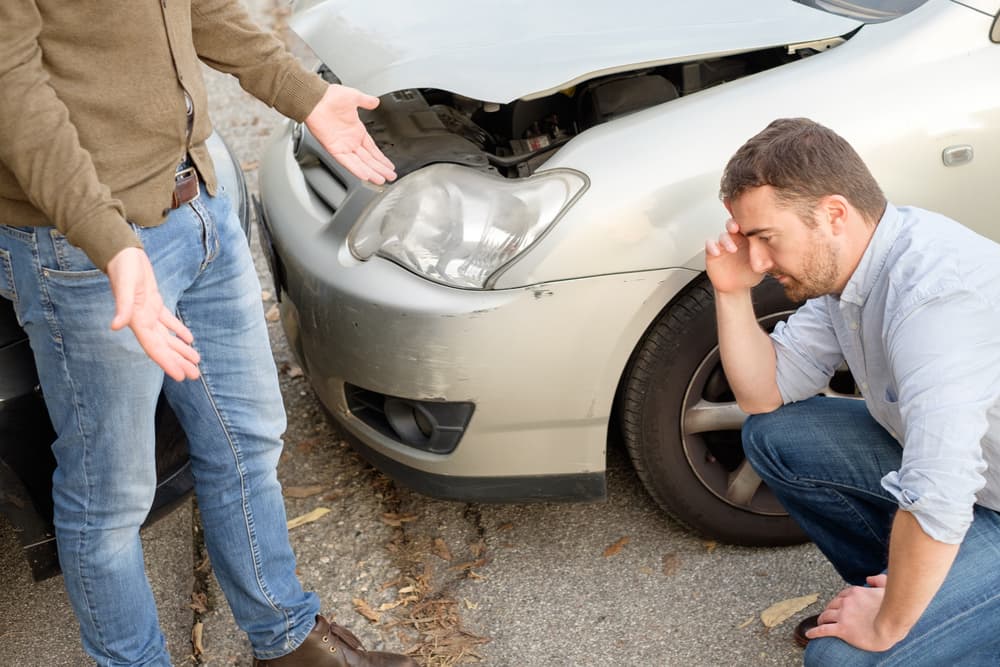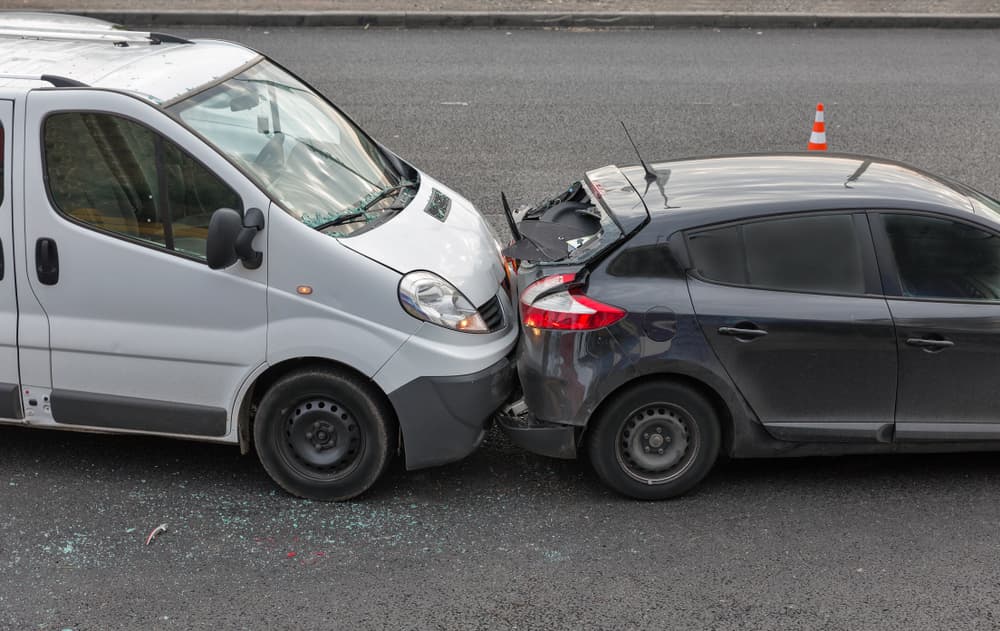Car accidents can lead to debilitating injuries along with financial complications, like high medical bills and lost income. When car accident victims file a claim with the at-fault driver's insurance company – or with their own insurance company via an uninsured or underinsured motorist claim – they may be eligible for financial recovery. However, if the accident victim settles their claim with the insurance company and signs a release, they generally cannot reopen their claim, absent some extremely limited circumstances.
If you suffered injuries in an accident that a negligent driver caused, an experienced Chicago car accident attorney in your area can guide you through the process, answer your questions, explain your legal rights, and advise on whether to accept a pending settlement offer or litigate your case to a conclusion in court.
Schedule a Free Initial Consultation Today!
Common Types of Car Accidents

Car accidents happen for many reasons and in many ways. Rear-end collisions are a common example, often occurring when a driver fails to maintain a safe following distance or becomes distracted at the wheel, leading to a failure to stop in time. These accidents can result in severe whiplash injuries and damage to the rear of the vehicle.
T-bone or side-impact collisions occur when one vehicle strikes the side of another. These accidents frequently happen at intersections when a driver disregards traffic signals, runs a stop sign, or fails to yield the right-of-way to another vehicle when appropriate. T-bone collisions can also lead to severe injuries, especially for occupants on the impacted side of the vehicle.
Failure-to-yield accidents are another category where a driver neglects to give the right of way, leading to collisions with other vehicles or pedestrians. These incidents often transpire at intersections, crosswalks, or when merging onto highways. Failing to yield can also result in a broad spectrum of injuries and property damage.
Moreover, head-on collisions are among the most severe types of car accidents. These accidents occur when two vehicles collide frontally, often due to a driver crossing into oncoming traffic. Head-on collisions can lead to catastrophic injuries and a higher likelihood of fatalities due to the force of impact.
Accidents resulting from distracted driving are also increasingly prevalent. Distractions such as texting, talking on the phone, listening to loud music, or using in-car stereo systems divert a driver's attention from the road. These distractions contribute to various accidents, from rear-end collisions to veering off the road.
Speed-related accidents may result from a driver exceeding the posted speed limit or driving too fast for the prevailing roadway or weather conditions. High speeds reduce reaction time and increase the severity of collisions. Speeding can also lead to many accidents, ranging from single-vehicle crashes to multi-vehicle pile-ups.
Negligent lane changes or improper merging can further lead to collisions. When a driver fails to signal or check blind spots before switching lanes, serious collisions may occur, including sideswipe accidents.
If you suffered injuries in any of these accidents that another driver caused, an experienced car accident lawyer can determine your eligibility for filing a personal injury claim with the insurance company and handle every step of the claims-filing process for you.
Injuries that May Result from a Car Crash
After a car accident caused by a negligent driver, victims may experience a range of physical and mental injuries, each presenting its own set of challenges. Some of those injuries and medical complications include:
- Whiplash
- Traumatic brain injuries (TBIs)
- Orthopedic injuries, such as fractures, dislocations, and sprains
- Post-traumatic stress disorder (PTSD)
- Depression and anxiety disorders
- Chronic pain
Additionally, victims may face challenges in resuming normal activities, leading to feelings of isolation and frustration. The disruption caused by physical injuries and the associated mental health effects (such as PTSD) can create a complex interplay of challenges for individuals working toward recovery.
Crashes can result in many physical and mental injuries. From whiplash and traumatic brain injuries to orthopedic issues and chronic pain, the effects are profound and underscore the need for comprehensive support – both in terms of medical care and addressing the psychological toll on accident victims.
What Happens During Settlement Negotiations with the Insurance Company?
Settlement negotiations with an insurance company after suffering injuries in a car accident are a dynamic process that involves several key stages. Throughout this process, an experienced car accident lawyer can be extremely helpful.
Initially, after you've reported the accident and provided essential details, the insurance adjuster will investigate the claim. This investigation usually includes reviewing the police report, assessing damages to the vehicles involved, and examining any available evidence, such as photographs or witness statements.
Once the initial investigation is complete, the insurance company may extend a settlement offer to the accident victim or their attorney. This offer typically represents their assessment of liability and the damages incurred. However, it's important to note that initial offers are often on the lower side, aiming to resolve the claim swiftly and at a lower cost for the insurance company.
At this point, the negotiation phase begins. As the injured party, you have the right to counter the initial offer. This involves providing evidence and documentation supporting your claim for higher compensation. Medical records, bills, and reports from healthcare providers become crucial in demonstrating the extent of your injuries and associated costs. Additionally, evidence of lost income, property damage, and any other relevant expenses should be presented during ongoing settlement negotiations.
Effective communication with the insurance adjuster is key during settlement negotiations. Clearly articulating the effect of the accident on your life, both physically and financially, strengthens your position. The negotiation process often involves back-and-forth discussions, with each party presenting counteroffers and arguments to reach a mutually agreeable resolution.
It's common for negotiations to involve compromises on both sides. The insurance adjuster may concede certain points, and you may need to adjust your expectations based on the evidence presented. Maintaining a respectful and professional tone is essential throughout this process, as it fosters a constructive atmosphere for reaching a fair settlement.
Upon reaching an agreement, the insurance company will issue a settlement check. This check encompasses the agreed-upon compensation for your injuries and losses. It's crucial to carefully review the settlement terms before accepting the check, as it often includes a release – a legal document confirming that you won't pursue further claims related to the accident.
Settlement negotiations can be complex and require a strategic approach. Seeking legal advice during this process is often beneficial, as attorneys experienced in personal injury cases can provide guidance, evaluate settlement offers, and protect your rights and interests throughout the negotiations.
What Makes a Particular Settlement Offer a “Good” Offer?

A car accident settlement offer is a “good” offer under the circumstances when it adequately addresses the unique aspects of the case and provides fair compensation for the injuries and damages the accident victim suffered. Evaluating a settlement offer involves comprehensively assessing various factors to ensure it aligns with the accident's circumstances.
First, the settlement offer should cover the full extent of medical expenses incurred due to the accident. This includes immediate medical care, ongoing treatment, rehabilitation, and any future medical needs arising from the injuries sustained. A good settlement offer takes into account not only current medical bills but also anticipates potential future expenses related to the injuries.
Compensation for lost income is another critical element of a good settlement offer. If the accident resulted in the victim being unable to work, the settlement should account for the income lost during the recovery period. Additionally, if there is a lasting effect on earning capacity due to the injuries, the settlement should reflect these long-term financial repercussions.
Property damage often results from car accidents, and a good settlement offer should cover the costs of repairing or replacing damaged vehicles and personal belongings. This ensures that the victim is not burdened with out-of-pocket expenses related to the physical damage that the accident caused.
Physical and emotional pain and suffering form a subjective yet significant component of a good settlement offer. It acknowledges the intangible hardships that the accident victim experienced, including pain, distress, and the overall effect on their quality of life. While challenging to quantify, a fair settlement offer takes into account the genuine suffering the accident victim endured as a direct result of their accident.
Furthermore, a good settlement offer recognizes the individual circumstances of the case, including any unique challenges or aggravating factors. This may involve factors like pre-existing medical conditions, the severity of the injuries, and the degree of negligence that the at-fault party exhibited.
Ultimately, a good settlement offer comprehensively and fairly addresses the specific damages the accident victim incurred. It reflects a balance between the tangible costs, such as medical expenses and lost income, and the intangible – yet significant – aspects of pain and suffering. Seeking legal advice during the negotiation process is often crucial to ensuring that the offered settlement aligns with the case's individual circumstances and truly meets the injured accident victim’s needs.
What Happens When You Sign a Settlement Release?
Signing a release upon settling a car accident claim with the at-fault driver's insurance company is a critical step with significant implications. A release is a legal document that essentially serves as a contractual agreement, absolving the at-fault driver and their insurance company from any further liability or obligation related to the accident. Understanding the consequences of signing such a document is paramount.
By signing a release, you acknowledge that the settlement amount offered is accepted as full and final compensation for the damages incurred due to the accident. This includes compensation for medical expenses, property damage, lost income, and other related costs. Once the release is signed, you forfeit the right to pursue any additional claims or legal action against the at-fault driver or their insurance company for the same incident.
It's crucial to thoroughly review the terms of the release before signing and ensure that the language is clear and comprehensive, covering all aspects of the settlement. If there are any uncertainties or concerns about potential future complications related to the accident, you should immediately consult with your car accident attorney.
After all parties sign the release, the settlement process is typically concluded. The insurance company will process the payment, and you will receive the agreed-upon compensation. It's imperative to keep a copy of the signed release and all related documentation for your records.
Extremely Limited Circumstances When an Injured Accident Victim Could Reopen Their Car Accident Claim
Reopening a car accident claim is typically challenging and generally permitted only in limited circumstances. One such circumstance is the discovery of new evidence unavailable during the initial claim process. This may include additional medical records, witness statements, or any information that sheds new light on the incident. However, the burden of proof is extremely high in these circumstances, and the new evidence must be substantial and relevant to the case.
Another scenario where reopening a car accident claim may be considered is if there was a fundamental error or mistake in the original legal proceedings. This may involve a misinterpretation of the law, a procedural error, or a significant oversight that affected the case outcome. Correcting such errors may necessitate revisiting the claim.
Moreover, if fraud or misconduct occurred during the initial proceedings, a court may entertain the idea of reopening a car accident claim. This can involve deceitful actions by the opposing party, concealment of crucial information, or any other fraudulent conduct that influenced the outcome of the case.
A key consideration is the statute of limitations, which imposes a time limit for legal action. Reopening a car accident claim after the statute of limitations has expired is exceptionally challenging and usually impossible. Therefore, time constraints are critical to be mindful of when contemplating revisiting a claim.
While there are limited circumstances where reopening a car accident claim is possible, it's crucial to demonstrate the existence of new, substantial evidence, correctable errors, or fraudulent conduct. Understanding the complexities involved and consulting with legal professionals is essential for anyone contemplating reopening a car accident claim to ensure a realistic evaluation of the situation and compliance with all applicable legal requirements.
Call an Experienced Car Accident Lawyer in Your Area Today
A skilled personal injury lawyer in Chicago can guide you through the claims process and determine whether you should settle or litigate your case. If your case falls within a limited exception that allows you to reopen the claim, your attorney can guide you throughout the process and work to recover the full amount of compensation you need for your injuries.



